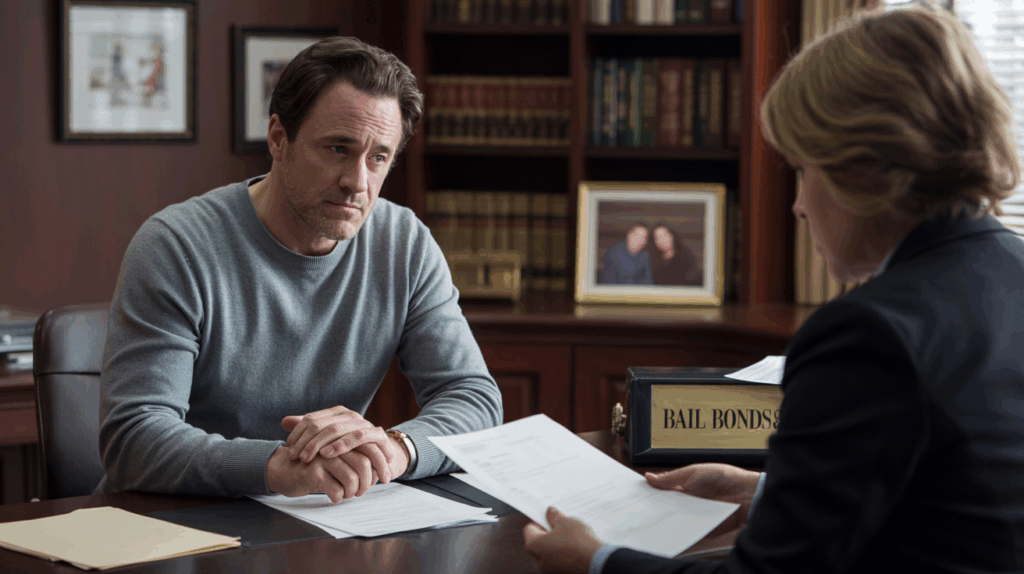While divorce cases often focus on custody, assets, and property division, legal matters can sometimes intersect with criminal charges. In such situations, understanding how bail bonds work becomes essential. For clients working with a San Diego divorce attorney, knowing the basics of bail bonds and how they may impact your family law case can help you navigate both legal systems more effectively.
What Is a Bail Bond?
A bail bond is a legal mechanism that allows a defendant to be released from custody while awaiting trial. Instead of paying the full bail amount upfront, a bail bondsman provides a surety bond to the court—typically in exchange for a non-refundable fee, usually 10% of the total bail. This enables the accused to continue daily life while preparing for court appearances.
In family law contexts, this may apply to one spouse or another party involved in a domestic dispute, protective order violation, or custody-related issue that escalates into criminal allegations.
How Bail Bonds Can Affect Divorce or Custody Cases

Though not common in every divorce, there are situations where one party may face arrest, leading to legal consequences that directly impact divorce proceedings:
- Domestic Violence Charges: When disputes become physical or police are called, one spouse may be arrested, especially if a temporary restraining order (TRO) is in place.
- Violation of Protective Orders: Disobeying a court-ordered protection directive can result in arrest and jail time—requiring bail to secure release.
- Substance Abuse-Related Offenses: Drug or alcohol offenses during a divorce case may result in criminal charges, triggering bail and court dates.
- Custody Interference or Parental Kidnapping: If one parent violates a custody order or unlawfully removes a child, arrest and bond proceedings may follow.
Each of these can introduce new legal complexities that must be addressed by your family law attorney, especially when bail and criminal proceedings impact custody arrangements or visitation rights.
How Your San Diego Divorce Attorney Can Help
If you or your spouse is involved in a case requiring a bail bond, your divorce attorney plays a critical role in protecting your legal interests. Here’s how:
- Coordinating With Criminal Defense Counsel: Your divorce lawyer may collaborate with a criminal defense attorney to align legal strategies, particularly when bail conditions affect parenting time or living arrangements.
- Modifying Custody or Support Orders: Arrest and release conditions may necessitate changes to temporary custody or financial arrangements. Your attorney can request emergency hearings if needed.
- Filing Protective Orders: If violence or threats are involved, your attorney can petition the court for restraining orders or supervised visitation during the criminal process.
- Ensuring Compliance With Court Orders: A skilled attorney helps ensure that any bail bond release terms do not violate family law orders and vice versa.
Bail Bond Conditions and Their Impact on Families
When a person is released on bail, the court often imposes conditions—such as no-contact orders, restrictions on travel, or limitations on parental rights. These conditions can affect family routines and divorce timelines, particularly if minor children are involved.
Violating any of these conditions can lead to revocation of bail, re-arrest, or further criminal charges, which can have serious implications in custody evaluations and court recommendations.
What to Do if Bail Bonds and Divorce Collide
If you find yourself in a situation where bail and divorce proceedings intersect, here are key steps to take:
- Notify Your Attorney Immediately: Whether you’re the arrested party or your spouse is, your attorney needs full awareness to act quickly on your behalf.
- Follow All Bail Conditions: Comply with every term of the bail bond, including court dates and communication limits. Non-compliance could hurt your family law case.
- Document All Incidents: Keep a record of any events, violations, or relevant communications, especially if they may affect your custody or safety.
- Avoid Direct Confrontation: Let your attorney handle communication and legal filings. Avoid actions that may trigger additional charges or violate orders.
- Consider Protective Orders: If your safety or your child’s safety is at risk, your attorney can help you obtain restraining orders or request emergency custody changes.
Understanding the Broader Impact of Criminal Charges in Divorce
Divorce is complex even without criminal matters, but when issues involving bail bonds arise, the consequences can be significant. A criminal charge doesn’t just carry legal risks—it can affect parenting plans, property division, and how the court views each spouse’s stability and credibility.
For individuals dealing with both criminal and family law challenges, having an experienced San Diego divorce attorney is vital. Your attorney will help ensure that both legal paths are managed correctly and that your parental rights, safety, and legal standing are protected throughout the process.
Need Help Posting Bail? Speak With a Trusted California Bail Bonds Agent
If you or a loved one has been arrested, time is critical. Whether the situation involves domestic issues, protective orders, or custody-related complications, securing release through a reliable bail bond is the first step toward resolving the matter effectively. A licensed bail bonds agent can guide you through the process with speed, discretion, and legal compliance.
Contact us now for a confidential consultation. Our experienced team is available 24/7 to help you navigate the California bail system and secure prompt release, so you can focus on what matters most.

